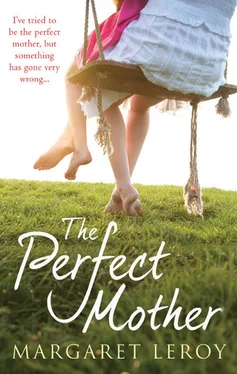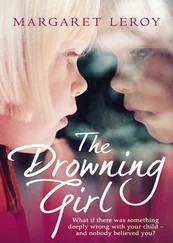I sip my wine and go back over the conversation with Dr Carey. I don’t understand why she wouldn’t take Daisy’s illness seriously. I must have done something wrong. Should I have cried? Should I have sounded more desperate? Maybe I was too assertive; or not assertive enough? Perhaps there’s a code I don’t know about, some goodmother way of behaving. I once heard a famous female barrister speaking on the radio. If she was defending a woman accused of murder, she said, she’d urge her to wear a cardigan to court, ideally angora and fluffy, so no one would think her capable of committing a terrible crime. Maybe there’s a dress code for taking your child to the doctor that’s unknown to me: a frock from Monsoon perhaps, with a pattern like a flowerbed, or a tracksuit and pink lipstick.
There’s a clatter from the hall—Richard closing the door behind him, putting his briefcase down. Relief washes through me: I’m always so glad when he’s home. He comes in, and I see he’s tired; he’s somehow less vivid than when he left in the morning, as though the dust of the day has settled on him and blurred him. He’s brought me flowers, blue delphiniums, wrapped in white paper, with a bow of rustling ribbon. He’s good at choosing things—orchids, silver bracelets; his gifts are always exact.
‘Thanks. They’re so lovely.’ They’re an icy pale blue, like a clear winter sky, the flowers frail, like tissue. I hold them to my face; they have the faintest smoky smell.
He kisses my cheek.
‘There’s pollen on you,’ he says. He rubs at my nose with a finger.
‘Was the meeting OK?’
He shrugs. ‘So so,’ he says.
I’m not sure this is true: he looks strained, older.
‘D’you want to eat?’
He shakes his head.
‘I’ll get you a drink,’ I tell him.
‘Thanks. Scotch would be good. Just tonight.’
I smile. ‘It was that bad?’
He shakes his head. ‘It was fine. Really.’
He has a still face; he’s always hard to read. I don’t pursue it, don’t know the right questions. There are parts of his life that are opaque to me.
I get him a large glass of Scotch, with ice, the way he likes it. He doesn’t sit, he’s restless—as though the uneasy energy that’s built up through the day won’t leave him. He leans against the mantelpiece, sipping his drink.
In the silence between us I hear Sinead upstairs, the clumping of her slippers and water from the shower running away. I’m worried she will wake Daisy. I’ve become alert again to all the noises of the house—like when you have a baby and skulk round like a conspirator, and every creak on every stair is marked on a map in your mind.
‘We went to the doctor,’ I tell him.
‘Good,’ he says. ‘How was it?’
‘We saw someone new. A woman. She was rather young, I thought.’
‘And was it OK?’
‘Sort of. Well, Daisy liked her.’
‘Excellent,’ he says. ‘There. I told you it would be all right.’
‘I’m not sure. I wasn’t happy really.’
‘What is it?’ he says, solicitous. ‘What’s wrong?’
‘I told her that Daisy wasn’t eating and she said I needed nutritional advice. It felt so patronising. Like she couldn’t really hear what I was saying. I keep worrying I handled it all wrong—you know, said the wrong thing or something. D’you think sometimes I don’t express myself right—d’you think I’m not assertive enough, perhaps?’
I want him, need him, to say, Of course not, of course you didn’t handle it wrong—it’s nothing to do with you.
‘Darling, you do rather brood on things,’ he says.
He’s standing just outside the circle of light from the lamp. Half his face is in shadow and I can’t see what he’s thinking.
‘And then she launched into this thing about how it was all psychological,’ I tell him.
There’s a little pause.
‘Well, maybe there’s something in that,’ he says then.
For a moment I can’t speak. The smoky smell of the flowers he’s brought clogs up my throat.
‘But how can there be?’
‘Look, darling,’ he says, ‘you do worry a lot. Maybe that affects Daisy in some way.’
‘I’m worrying because she’s ill. How could that make her ill? I don’t understand. Is that so bad, to worry?’
‘Well, I guess it’s not ideal,’ he says. ‘But with your background, it’s maybe not so surprising.’
I hear a sound of splintering in my head. There’s a sense of shock between us. He shouldn’t have said this, we both know that. But instead of taking it back, he tries to explain.
‘You know, all those things you went through. It’s bound to affect you…’
He turns a little away from me. I see his face in the mirror, but his reflected image is strange to me, reversed and subtly wrong. The darkness reaches out to me from the corners of the room.
‘You’re a bit of a perfectionist,’ he says. ‘We both know that. You want everything to be just right, you can’t just go with the flow. That’s understandable. It’s perhaps one of the effects of…’ His voice tails off.
‘One of the effects of what?’ My voice is small in the stillness.
‘Darling,’ he says. ‘You know I think you’re a wonderful mother. No one could care for those girls better than you. But maybe sometimes you try almost too hard.’
His eyes are narrow: for a moment he looks at me as though I am a stranger.
‘How can you try too hard?’ I say.
‘All I mean is—of course it’s a worrying situation. But you get worried perhaps a bit more than you need to. And maybe in some ways that makes things worse. Maybe you expect things to go wrong.’
There’s a sense of pressure in my chest, like something pushing into me, making it hard to breathe.
‘I just don’t see how that could make Daisy ill,’ I say.
He hears the catch in my voice. He comes to sit beside me.
‘Cat,’ he says, ‘now don’t go getting upset.’
He ruffles my hair, as though I am a child. His hand on me soothes me, as he knows it will.
‘What about the hospital?’ he says.
‘We’re getting the referral.’
‘Well, that’s all that matters really,’ he says.
‘What if she puts it in the letter—that she thinks it’s psychological? They won’t take Daisy seriously. If they think that, no one’ll bother to try and find out what’s wrong.’
‘Of course she won’t put it in the letter,’ he says. ‘I mean, these are the experts, aren’t they? She’ll leave them to make up their own minds. None of this adds up to anything,’ he says, and puts his arm around me. Yet still I feel that something has been broken.
There’s a road I won’t go down. Poplar Avenue. A harmless name, a name like any other. There’s a house in that road, a wide-fronted house set well back from the street. There are rooms in that house with glass-panelled doors, the panels covered over with brown paper. Richard started to drive down Poplar Avenue once, by mistake, when we were coming home from Gina and Adrian’s, and a car crash in the one-way system had caused a massive tailback. He turned round when he realised: he knows, I’ve told him some of it, and he read about it in the papers during the inquiry. But nobody knows all of it, except those of us who were there.
I was thirteen when I went there. My mother couldn’t cope with me—or so she told the social worker, as I lurked behind the bead curtain in the squalid kitchen of our tiny flat, that I’d tried to clean up, knowing the social worker was coming, hearing everything. ‘I need a break,’ said my mother. ‘Just for a month or two. To get myself together.’
The social worker said she admired my mother’s honesty, and it probably was for the best. She asked if there was anyone I could go to. ‘No,’ said my mother, ‘we only have each other.’ The social worker said not to worry, she was pretty sure that there was a place at The Poplars. And I wouldn’t even need to change schools, so really it didn’t have to be too disruptive.
Читать дальше












